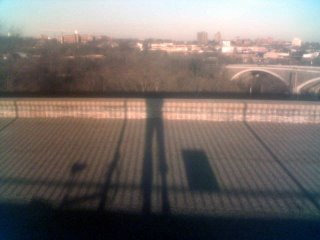I drove up to the huge kosher supermarket in far Northwest Baltimore today, which I discovered earlier this month in my search for Sabra Salads hummus. You can buy the huge 17 oz. containers there for $4. At least you can if you don't go on Saturday, when it is of course closed for the Sabbath...doh. Many of the neighborhoods along Reisterstown Road on the way up there are thoroughly depressing -- more boarded up houses than occupied ones, few businesses have any windows, etc. It seemed almost third world when about 10 kids on dirtbikes showed up going the other way, some doing sustained wheelies while waving, others riding on the sidewalk.
This afternoon I took a bike ride out to Druid Hill Park. I'd never biked out there before, even though it's not far from our house, and it was pretty nice. It's a very large park, and it could be great if it were a bit better taken care of. Baltimore has a lot of parkland, and I suspect that resources to take care of it are very stretched, like everything else in the city budget. I remember many people in Minneapolis making disparaging remarks about the fiefdoms within city government, including the Park Board, which in many ways acts as an independent municipal government. But the parks in Mpls are extensive and well taken care of, and it might be due in part to having a strong institution behind them. Anyway, I took this hazy picture with my cell phone from the edge of Druid Lake, looking east.

I-83 is hidden in the valley immediately below, and the Wyman Park Building, where my program is located, is the large building with the white cupola toward the left side.
On Tuesday I went to the Transportation Research Board conference in DC, courtesy of my new employers at the state highway department. I got there at 8am and stayed until 9:30, so it was a long day. It was actually pretty interesting; there were hundreds of sessions, but fortunately you could search through them online ahead of time. (The conference ran all week and took up three hotels.) My favorite session was on the implications of information technology for travel patterns.
My two Public Health classes started last week. Research Methods seems like it will rehash a lot of stuff I feel like I already know, which is too bad, but it should still be useful (and required, anyway). Social Inequality and Health is taught by a complete socialist. It will be interesting, but way ideological. My Homewood classes start Monday.

2 comments:
Whenever people mutter "global warming" in reference to the unusually warm January we're having, I can't help pointing out that Eastern Europe and Russia are having a record *cold* winter. I almost feel like I'm helping the enemy, since climate change desperately needs to be taken more seriously--there seem to be scarier and scarier reports mentioned in the news every week, while Bush fiddles away. But said reports are talking about changes on the scale of 2 degrees Celsius in average future global temeperature, or about sea level change over the next 1000 years, not 40 deg F swings in daily temps in mid-North America.
Which I suppose is why it's so hard to get people to pay attention: the things we're doing right now have far-reaching and irreversible consequences, but people living anywhere except the Artic aren't going to feel those consequences for dozens or hundreds of years. People, especially Americans, I think, don't look far enough ahead.
Yeah, you're right that taking warm days as evidence of global warming is misunderstanding the problem.
As I understand it, scientists seem to think that climate change, while warming the world on average, could have wildly different effects on different climates -- dry plains will become rainy, ocean-cooled regions will become warmer, more hurricanes hitting land because of warmer ocean temps, etc. One specific non-warming effect I've heard mentioned a number of times is that the ocean current that keeps northwest Europe warm (the Gulf Stream?) might slow or cease because of changes in water circulation patterns. There is some evidence that it has already slowed.
All of which goes toward your larger point, that it's really difficult to form the needed public consensus in favor of action when the issue is so complicated and effects so hard to perceive and sort out. I certainly hope that we find a way to overcome this. (What we really need is more elitism: One reason that Europe is moving faster than us on this is that political elites have more power there, and it's easier to persuade political elites that action is necessary than it is an entire country. An example of this is that majorities in most European countries still support the death penalty, but it is off the table as far as political leaders are concerned.)
Post a Comment